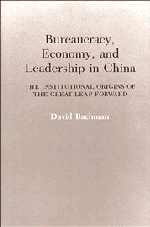Book contents
- Frontmatter
- Contents
- Preface
- Acknowledgments
- Chronology
- 1 Introduction
- Part I Historical background and conceptual approach
- Part II The institutional origins of the Great Leap Forward
- 4 The financial coalition
- 5 The planning and heavy industry coalition
- 6 The Party as agent of social transformation
- 7 The views of the top leadership
- 8 The Third Plenum of the Eighth Central Committee and the Great Leap Forward
- 9 Conclusions
- Appendix: The constraints on Mao
- Bibliography
- Index
6 - The Party as agent of social transformation
Published online by Cambridge University Press: 21 March 2010
- Frontmatter
- Contents
- Preface
- Acknowledgments
- Chronology
- 1 Introduction
- Part I Historical background and conceptual approach
- Part II The institutional origins of the Great Leap Forward
- 4 The financial coalition
- 5 The planning and heavy industry coalition
- 6 The Party as agent of social transformation
- 7 The views of the top leadership
- 8 The Third Plenum of the Eighth Central Committee and the Great Leap Forward
- 9 Conclusions
- Appendix: The constraints on Mao
- Bibliography
- Index
Summary
In contrast to the coalitions examined in the two preceding chapters, the Chinese Communist Party (CCP), as the agent of social transformation, is not predominantly concerned with economic issues. The function of social transformation is to restructure and reform society and social relations. In most revolutionary societies in the twentieth century, and certainly in China, the Communist Party is the special institution of social transformation. The Communist Party, once it seizes power, also provides overall leadership in the political system and mediates the relationships among the other intrastate coalitions. The Communist Party, then, is both above the other coalitions (this is particularly true of the central leadership) and the embodiment of one particular coalition. In its capacity as the organization charged with social transformation, the Communist Party is different from other ruling parties in one-party states. In Benjamin Schwartz's elegant characterization,
the mystique of the Communist Party lies not in its organizational structure but in its transcendent status as the incarnation of the will of History and in its universal, messianistic, “proletarian” mission. From this stems its claim of infallibility and utter disinterestedness. It was this that provided the sanction for totalitarian intervention in every corner of life.
After completion of the “Socialist Transformation of Capitalist Industry, Handicrafts and Commerce” and the collectivization of agriculture, the CCP had apparently completed its mission. Following the Soviet model, there was nothing left to be transformed – China had arrived at socialism (state ownership).
- Type
- Chapter
- Information
- Bureaucracy, Economy, and Leadership in ChinaThe Institutional Origins of the Great Leap Forward, pp. 133 - 156Publisher: Cambridge University PressPrint publication year: 1991



